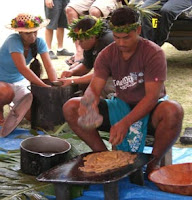Taro is easily the most important crop vegetable here in Rurutu. Each of the three major villages has extensive taro fields, with each family sharing the irrigated taro patches. I think the taro patch in Avera is one of my favorite places on the island, you can almost feel the history seeping up through the ground when you're there, and it's great to watch the men working away in the fields (women are not supposed to cultivate taro in Rurutu)
 Taro fields, Avera, Rurutu - photo: A. Machado
Taro fields, Avera, Rurutu - photo: A. MachadoAt one point in Rurutu's history stealing taro was an offense that could be punished by death and several of the tribal wars started as a result of taro theft. This may date from a time when there were many more inhabitants on the island - Cook's records estimate that there may have been as many as 20,000 people living on Rurutu when he passed by (that's about 10x more than today!).
Our taro varieties - the red-stemmed bunches are 'mana ura' from Rurutu,
black-stemmed are a variety from Rapa
and the green-stemmed a variety from Rimatara.
Taro is a plant in the Aracaceae (
Colocasia esculenta var.
antiquorum), we eat the leaves (fafa - when cooked they have a delicate spinach-like flavor that I love) and most often the root or rather to be precise it's a corm (a bit like a super dense, violet, starchy potato). For some reason the soil in the Australs and particularly Rurutu yields a superior tasting/textured taro corm to Tahiti, so we often export to friends and family in Tahiti (even I can tell the difference, and I'm definitely a taro novice!). There are several varieties that are grown here, the most popular being 'mana ura' (translated literally it means 'red power', the variety has red stems and the corm has a good firm texture and purple hue).
Taro has been in cultivation for about 10,000 years in Papua New Guinea, making it one of the oldest crop plants. It's very easy to grow, you just re-plant the cut stem and top corm, after harvesting.
 Viriamu demonstrating how to plant taro, photo:R.Gouiran
Viriamu demonstrating how to plant taro, photo:R.GouiranAbout 10% of the world's population is reliant on taro as a diet staple. The Polynesians brought the root with them when they colonized the remote central Pacific. It is also widely cultivated in Hawaii, and indeed used to be considered to be the noblest of the food crops there. In Hawaiian legend the firstborn child of the daughter of father earth and her husband father sky was stillborn, the child was buried and there at the grave grew the first taro plant. Their second child, a healthy boy, gave rise to the human race. Hawaiian royalty adopted taro-leaf designs on their livery. There is a
taro festival held annually in East Maui, Hawaii, to honor this sacred root - I'd love to check it out someday! In Hawaii taro is primarily eaten as poi, a slightly fermented taro paste. Here we do have poipoi, which is pounded fermented cooked taro, but it is of a much thicker consistency and is eaten in hunks, or tiromi which is grated taro that has been cooked in the Tahitian oven. But we mostly just eat taro boiled in water, in place of bread or other starch. It's great with coconut milk, and we often eat boiled fish with coconut milk and taro, with a dash of salt and lime.
However, I've been discovering that taro is not just a Polynesian thing, it is eaten across the humid tropics (Southeastasia, the wet tropics of Africa and Egypt, the West Indies and parts of South America). The ancient Romans even used to eat the root, imported from Egypt! It has many different names, here are just a few - dasheen, eddoe, gabi, kalo, dalo, culcas, guagui, callaloo, keladi, sato imo, cocoyam, arbi. There are clearly a large number of different varieties with slightly different sized or colored corms stems or leaves. There are also many ways of preparing taro - I have a wonderful recipe/history book from my last trip to Hawaii:
Hawaii Cooks with Taro, by Marcia Mager, Alvin Huang and Muriel Miura (the taro-corn chowder is just wonderful) and I have some traditional recipes from friends and family, but I'm always ready to try something new! I would love to hear from you if you have any recipes to share....
 OK, so her cats and fish also look like balloons, but I think they're actually quite good for 26 months.... She's generally just a scribbler, so this is a marked advance.
OK, so her cats and fish also look like balloons, but I think they're actually quite good for 26 months.... She's generally just a scribbler, so this is a marked advance.






































